South China Sea: David v Goliath as dispute goes to court
- Published
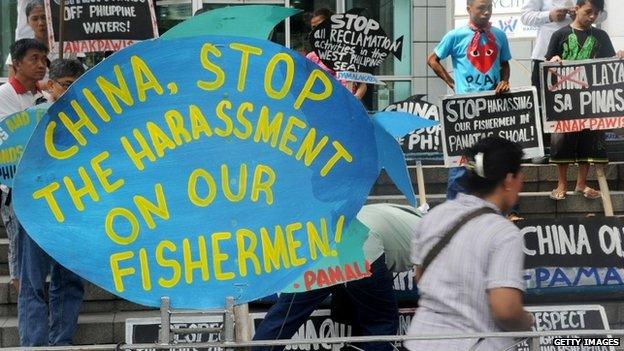
Activists in Manila have voiced their anger at China's actions
It's a David and Goliath struggle at an international tribunal in The Hague on Tuesday. Or it would be if Goliath had turned up.
In 2010, China's then foreign minister, Yang Jiechi, told uneasy neighbours: "China is a big country, other countries are small countries, and that's just a fact."
But size is not legal currency when it comes to competing claims in the South China Sea. The five judges in the Court of Arbitration will decide the case of the Philippines versus the People's Republic of China, according to the United Nations Convention on the Law of the Sea (UNCLOS) to which both countries are signatories.
Legal challenges are cheaper than military build-up, and a more level playing field for the tiny Philippines against its giant neighbour.
Manila cannot seek a sovereignty ruling at the International Court of Justice without China's agreement. But it can invoke dispute settlement procedures under UNCLOS even if China refuses to take part.
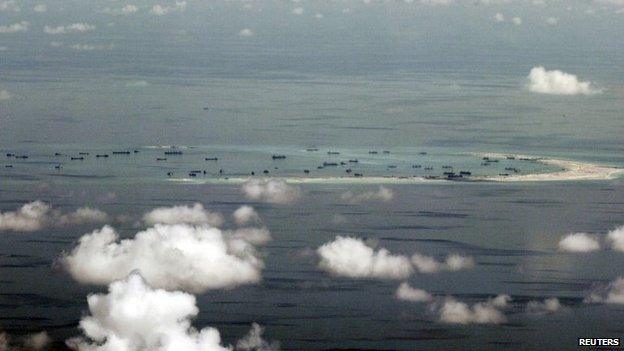
This aerial photo taken from a Philippine military plane shows the alleged ongoing land reclamation by China on Mischief Reef in the Spratly Islands
Beijing has refused to take part, making its presence felt only by challenging the tribunal's jurisdiction. It is playing for time.
These things do take time. The case was brought by Manila two and a half years ago to establish its right to exploit waters in a 200 nautical mile exclusive economic zone. But in the past 18 months, China has gone about creating facts on the ground, reclaiming perhaps 2,000 acres of land from the sea in what one American admiral described as a "great wall of sand".
Strategic ambiguity
The objective seems to be to force rivals like the Philippines to negotiate on new terms. But again, this has no legal basis. The convention says you can't build sovereignty out of sand or anything else.
The Hague decision will be legally binding but unenforceable as there is no UN body to police such rulings.
But China likes to present itself as a responsible UN player and however it may bluster about not acknowledging the tribunal's jurisdiction, a decision against it would be a diplomatic blow. It would also set a worrying precedent, possibly emboldening other territorial rivals to follow the Philippines down the same path.
So in the Hague, China is on the defensive. But in general, China plays offence in the South China Sea. Offence with a rhythm of tactical attacks and retreats and an overlay of strategic ambiguity.
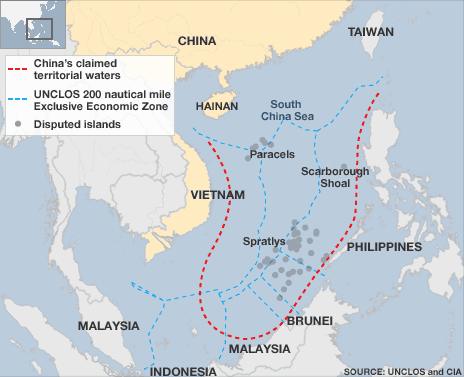
The ambiguity is fairly staggering. Firstly it does not clarify its actual claims. The nine-dash line that appears on Chinese maps encompassing almost the entirety of the South China Sea includes no coordinates.
Beijing has not explained the legal basis for its maps. Nor has it explained whether it sees the South China Sea as one of those "core interests" like Taiwan or Tibet on which it brooks no opposition.
Chinese lake
Recently Beijing announced that it had finished reclamation work on the Spratly Islands, which are claimed by the Philippines and others. It said construction would now begin on facilities that would include humanitarian and environmental functions as well as military ones.
But it did not clarify the terms under which other countries might use these facilities. For example, would they have to acknowledge Chinese sovereignty to do so?
A Chinese admiral told a recent regional security summit that construction work on the Spratly Islands is "justified, legitimate and reasonable".
But it was a bald assertion with no supporting evidence, nor any attempt to reassure China's neighbours, let alone the rest of the world, on how their interests would be served by accepting that one of the most important maritime routes in the world, with an estimated $5 trillion (£3.2tn) in ship-borne trade, should now become a Chinese lake.
As one US observer noted, external: "Only China can contain China", and it is making a good job of it, pushing worried neighbours into the secure embrace of the United States with an escalated programme of joint exercises and military assistance."
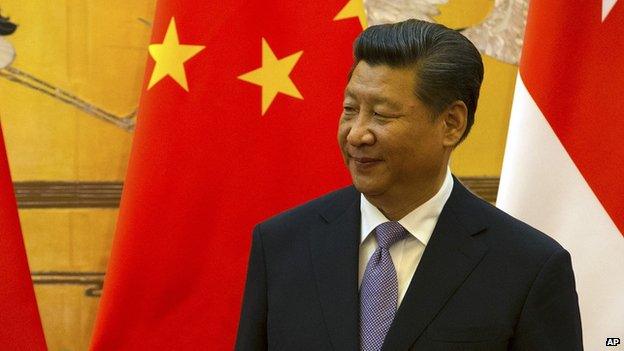
President Xi Jinping says he wants all countries to respect each other as equals
How can this assist China's other objectives in the region?
The "one belt, one road" project, for example, through which it wants to wrap South East Asia into a Sinocentric infrastructure embrace.
Beijing tells its neighbours to see this as a vision of shared destiny. But does the South China Sea trump this economic integration project? Or vice versa? China's neighbours need reassurance not intimidation.
Future generations
On security co-operation in Asia, President Xi has talked of four principles:
respect equals
win-win co-operation
pursue common security
inclusiveness
And Premier Li Keqiang said recently that China knows it is the great beneficiary of the present world order. Why destroy it?
But when it comes to the South China Sea, China looks ready to put its wider interests at risk for a few barren rocks.

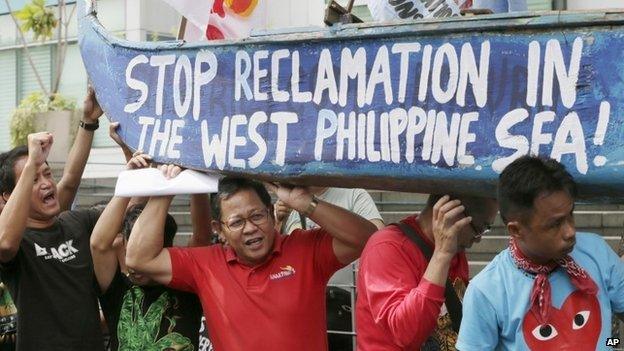
What is the South China Sea dispute about?
It is a dispute over territory and sovereignty over ocean areas, and the Paracels and the Spratlys - two island chains claimed in whole or in part by a number of countries. Alongside the fully fledged islands, there are dozens of rocky outcrops, atolls, sandbanks and reefs, such as the Scarborough Shoal.
China claims by far the largest portion of territory - an area defined by the "nine-dash line" - which stretches hundreds of miles south and east from its most southerly province of Hainan.
Beijing says its right to the area goes back centuries, but Vietnam hotly disputes China's historical account.
The other major claimant in the area is the Philippines, which invokes its geographical proximity to the Spratly Islands as the main basis of its claim for part of the grouping.
Malaysia and Brunei also lay claim to territory in the South China Sea that they say falls within their economic exclusion zones, as defined by UNCLOS.
Brunei does not claim any of the disputed islands, but Malaysia claims a small number of islands in the Spratlys.

Of course, the neighbours are not the only constituency in question. Foreign Minister Wang Yi said recently that retreat from China's claims to the South China Sea "would not be forgiven by future generations".
Recent opinion surveys suggest that the Chinese public may feel the military balance is already on China's side. In one poll, nearly three-quarters of those questioned felt that China would have the upper hand in any conflict in the South China Sea, even if the US Navy intervened.
But cooler strategic heads may reflect that 70 years after Tokyo's imperial forces were ejected from the South China Sea, the Japanese navy is back, supplying hardware to the Philippines and Vietnam and conducting naval exercises with the former. This is surely an own goal for China.
China has declared the Hague arbitration a "political provocation in the guise of law that seeks to deny China's national sovereignty in the South China Sea".
But perhaps the long hours, days and weeks of monitoring legal arguments in which it refuses to take part will provide Beijing with pause for thought. After all, President Xi himself has said, "if you want to go fast, go alone; if you want to go far, go together".